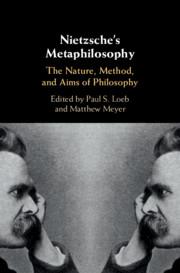Book contents
- Nietzsche’s Metaphilosophy
- Nietzsche’s Metaphilosophy
- Copyright page
- Contents
- Contributors
- Acknowledgments
- Note on Texts, Translations, and References
- Abbreviations
- Introduction
- Part I Evolving Metaphilosophies
- Part II The Nature of Philosophy
- Part III The Method of Philosophy
- Part IV The Aims of Philosophy
- Bibliography
- Index
Introduction
Published online by Cambridge University Press: 24 October 2019
- Nietzsche’s Metaphilosophy
- Nietzsche’s Metaphilosophy
- Copyright page
- Contents
- Contributors
- Acknowledgments
- Note on Texts, Translations, and References
- Abbreviations
- Introduction
- Part I Evolving Metaphilosophies
- Part II The Nature of Philosophy
- Part III The Method of Philosophy
- Part IV The Aims of Philosophy
- Bibliography
- Index
Summary
“What is philosophy?” is a question first raised by Plato when he invented the term and drew a sharp distinction between philosophical inquiry, on the one hand, and Homeric poetry, pre-Socratic natural science, and Sophistic argumentation, on the other. Plato’s definitional answer was that philosophy is the love of wisdom, which meant a search for truth, conducted primarily in the foundational areas of ontology, epistemology, and philosophy of mind, and having important consequences for the axiological fields of ethics, politics, and aesthetics. This answer remained constant throughout the subsequent history of philosophy, despite the important glosses added by Aristotle’s teleology, Descartes’ dualism, Hume’s skepticism, Kant’s idealism, Hegel’s historicism, and Schopenhauer’s voluntarism.
- Type
- Chapter
- Information
- Nietzsche's MetaphilosophyThe Nature, Method, and Aims of Philosophy, pp. 1 - 6Publisher: Cambridge University PressPrint publication year: 2019

